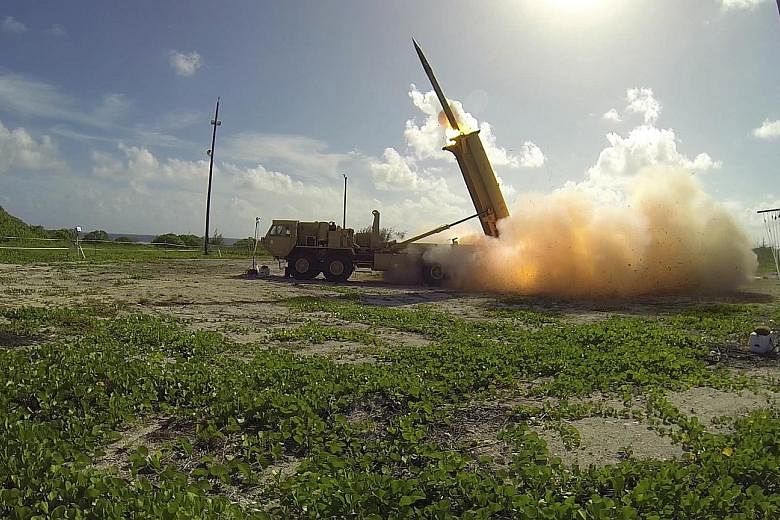BEIJING • However isolated North Korea may be, it has long had one major ally: China. But for two years, China's leader, President Xi Jinping, seemed to be favouring Pyongyang's neighbour and nemesis to the south.
He spent much political capital wooing South Korea's President, Ms Park Geun Hye, in hopes of drawing the country away from its long-time ally, the United States. He made an elaborate state visit to Seoul while shunning North Korea and its young leader, Mr Kim Jong Un, who he has yet to meet. Ms Park returned the favour last year, coming to Beijing for a major military parade at Tiananmen Square, the only leader of a US ally to attend.
But on Friday, it became clear that Mr Xi's efforts had fallen short. In announcing plans to deploy an advanced US missile defence system on South Korean soil, Ms Park's government showed that it was embracing its alliance with Washington more than ever and that it would rely less on China to keep North Korea and its nuclear arsenal at bay. In Beijing, the decision was seen as a major setback, one that went beyond its interests on the Korean peninsula to the larger strategic question of an arms race in North-east Asia that could impel China - and Russia - to develop more sophisticated weapons.
Analysts said the deployment of the so-called Terminal High Altitude Area Defence system, or Thaad, would reinforce the already-high level of mistrust in US-China relations as the Obama administration nears its end, adding to the raw nerves over disputes in the South China Sea and differences over US business access to the Chinese market.
And North Korea, an issue on which there had been some common ground between the two powers, is likely to become a greater source of irritation, as China loses an incentive to be tougher on the regime. North Korea yesterday test- fired a submarine-launched ballistic missile off its east coast, the South Korean military said. The North also tested a submarine- launched ballistic missile in April.

In announcing the missile system, which has been under discussion for years, the top commander of the US military in South Korea, General Vincent K. Brooks, said on Friday that it was needed to protect South Korea from the North's nuclear weapons. But Chinese officials have repeatedly said that they do not believe the North Korean threat is the true reason for the US-initiated deployment. Rather, they say, the purpose of the Thaad system, which detects and intercepts incoming missiles at high altitudes, is to track missiles launched from China.
Now that the system's implementation has been confirmed, China will almost certainly consider developing more advanced missiles as a countermeasure, said Mr Cheng Xiaohe, an associate professor at Renmin University in Beijing and a North Korea expert.
"A way to deal with Thaad - a shield - is to sharpen your spear," Prof Cheng said.
The possibility of the Thaad deployment has bedevilled relations between Washington and Beijing for more than a year.
Last month, Mr Xi and President Vladimir Putin of Russia made a point of denouncing the Thaad system during the latter's visit to Beijing, equating it with the US-built Aegis Ashore ballistic missile defence system deployed in some Nato countries. The implicit message was that the US was trying to encircle China in the same way that, according to Mr Putin, it was trying to contain Russia.
Some in South Korea have expressed concern that China, the country's top trading partner, might try economic retaliation for the Thaad deployment. Mr Cheong Seong Chang, a senior analyst with the Sejong Institute in Seongnam, said China could reduce the number of tourists it allows into the country or boycott some South Korean goods.
Mr Wu Xinbo, director of the Centre for American Studies at Fudan University in Shanghai, said Beijing was unlikely to take such measures in this period of slower economic growth. But he said the debate over North Korea among senior Chinese leaders would probably be reshaped, with officials who favour better relations with Pyongyang gaining more influence.
NEW YORK TIMES

